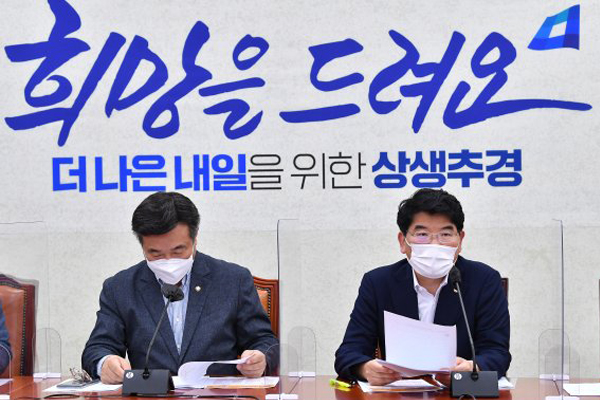South Korea’s ruling Democratic Party (DP) is pushing ahead with a controversial approach to upend inter-Korean relations by passing a resolution calling for the end of the Korean War armistice agreement signed in 1953.
The media already is speculating that President Moon Jae-in will try to make a final attempt at meeting with the North Korean dictator Kim Jong-un, possibly by taking advantage of the Winter Olympics in Beijing next year. The latest news about the DP’s move to pass the resolution drew strong criticism from conservatives, who view it as an attempt at appeasing the North that is bound to fail.
The Asia Economy newspaper reported that Lee Jae-jung, a lawmaker from the DP and a ranking member of the National Assembly’s Foreign Affairs and Unification Committee, said, “We introduced the resolution in last month’s subcommittee meeting, and we were not able to work on it then, but we will hold another meeting in the third week of August and discuss this issue thoroughly.” She said the resolution was already reviewed by the committee responsible for mediation and coordination at the National Assembly. She added that, “It is now the time to finalize it and give a final answer [on the issue].”
The resolution was first introduced in June last year by Rep. Kim Kyung-hyup of the DP. A total of 174 lawmakers listed their names as co-sponsors. The resolution was sent to the foreign affairs and unification committee for consideration, but was suspended as the main opposition People Power Party (PPP) opposed it by saying the conditions for ending the Korean War have not yet been met. Also, this was when a South Korean civil servant at a fishery agency was shot and killed in North Korea and his body was burnt. Thus, the resolution was sent to the committee responsible for coordinating controversial bills and resolutions for further consideration.
“The opposition party argues that there is no need to rush it, as inter-Korean relations are strained, but we need to prepare at the legislative level ahead of the environment for a reconciliation being made,” Lee said. “We have to pass this through voting even though the opposition party opposes this.”
Currently, there are 21 members on the foreign affairs committee. Among them, 12 lawmakers are most likely to vote for the bill. 11 lawmakers are from the DP and another lawmaker is Kim Hong-gul, who is the son of former leftist President Kim Dae-jung and was expelled from the DP. When considering the fact that lawmakers considered to be “liberal” hold a supermajority at the National Assembly, or around 180 seats out of 300 total, the resolution will most likely be passed in the full voting session once it gets passed through the committee meeting.
The resolution calls for North Korea, the United States, and China to sign the end of the armistice agreement right away. The resolution also has provisions that call for negotiating a peace agreement with the North, progress in U.S.-North Korea denuclearization negotiations, and cooperation in dealing with COVID-19 issues.
The PPP is against the resolution. Lawmakers from the party argued that the Moon Jae-in administration and the ruling party are trying to use North Korea for their political interests ahead of the next presidential election. They also pointed out that North Korea did not formally apologize to South Korea for the killing of the civil servant and the demolition of the Kaesong liaison office.
The Voice of America (VOA) interviewed former commanders of U.S. Forces Korea, and they showed concerns that the end of the armistice would not automatically lead to peace.
“An operable peace treaty with North Korea is philosophically possible, but extremely unlikely at this time,” said General (Ret.) Burwell Bell. “There is no way that the United States would ever sign a peace treaty with North Korea as long as they possess nuclear weapons.”
“In any peace treaty process, North Korea would have to demonstrate that its armed forces are no longer an immediate threat to the Republic of Korea. To accomplish this they would not only have to denuclearize, but also move their forward deployed army considerably north of their present positions along the DMZ. This would include their long range artillery and missile forward deployments which directly threaten Seoul.”
He added that, “I would strongly oppose any unilateral declaration of the end of the Korean War unless it is accompanied by a full peace treaty with the above conditions being met.”
General (Ret.) James Thurman expressed similar views.
“I believe we need to end the Armistice with a signed peace treaty. This should include denuclearization and provisions for elimination of human rights violations. North Korea should not be able to threaten its neighbors.”
He added that, “I do not think a peace treaty is doable if North Korea continues as a nuclear capable nation.”
General (Ret.) Vincent Brooks, who led the U.S. Forces Korea from 2016 to 2018, took a different stance on the issue. “Declaring an end to the state of war with North Korea would represent a fundamental change to politics on the Korean Peninsula and potentially provide Kim with an opening to pivot his own domestic rhetoric regarding the United States and South Korea,” he wrote in Foreign Affairs on July 29. “It could enable further confidence-building measures, which could in turn open a pathway toward denuclearizing the peninsula and achieving the multifaceted security guarantees North Korea truly seeks.”
When asked about ending the Korean War, a spokesperson from the State Department told VOA that, “Diplomacy and dialogue are essential to achieving complete denuclearization and to establishing permanent peace on the Korean Peninsula.”


